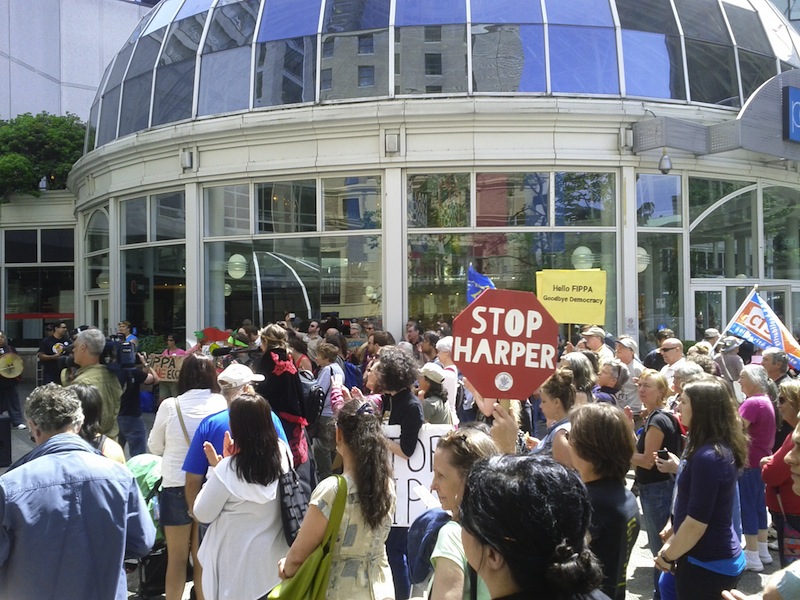Hundreds of people rallied in Vancouver in solidarity with the Hupacasath First Nation, which is in federal court June 5 to 7 to challenge the Canada-China Foreign Investment Protection Agreement (FIPA). The injunction against the FIPA, which has support from the Union of B.C. Indian Chiefs, Chiefs of Ontario, and a dozen other civil society groups including the Council of Canadians, is based on the impacts the treaty’s excessive corporate “rights” could have on Indigenous communities and the Government of Canada’s failure to consult with First Nations before signing the deal late last year.
“Like many other Canadians, First Nations across the country are deeply concerned FIPA will take full advantage of the now greatly weakened and watered-down federal environmental assessment process allowing foreign corporations to coerce federal or provincial governments through secret tribunals preventing restrictions on tar sands development or implementation of protective environmental policies,” said Grand Chief Stewart Phillip, President of the Union of BC Indian Chiefs, in a press statement this morning.
Solidarity rallies were planned in Nanaimo, Comox, Calgary, Guelph and elsewhere. The Guelph chapter of the Council of Canadians gathered outside local MP Frank Valeriote’s office this morning (see photo) in support of the Hupacasath, and to urge all elected officials to rethink Canada’s obsession with corporate rights treaties like the FIPA. These treaties grant companies excessive rights to challenge environmental, public health, resource conservation and other democratic decisions in front of a three-person, closed-door arbitration panel with the ability to hand out multi-billion dollar fines against governments.
Canada has paid out $160 million to U.S. companies under similar investor protections in the North American Free Trade Agreement. We are on the hook for another $5-billion in claims, including a demand for $250 million in compensation because Quebec’s partial moratorium on hydraulic fracturing (fracking) for natural gas deprives Lone Pine resources of the “right” to profit from this unwanted resource project. It’s not a matter of if China-based companies will sue Canada but when — and for how many millions or billions of dollars. On that basic level, we can’t afford to let Harper ratify the FIPA.
B.C.-Yukon Regional Organizer Harjap Grewal participated in the march and rally outside the Vancouver courthouse hearing the FIPA challenge, along with Grand Chief Stewart Phillip, Reuben George of the Tsleil-Waututh Nation, Brenda Sayers with the Hupacasath, Cliff Atleo, president of the Nuu-chah-nulth Tribal Council, and others.

Brenda Sayers, a representative of the Hupacasath Nation, said, “We want to thank all of the organizations and individuals for their great efforts to shine a light on the dangers of this agreement to all communities across the country and while our legal challenge is based on our inherent Indigenous rights, we believe we are fighting on behalf of all Canadians who truly value the environmental legacy we shall leave to our grandchildren’s grandchildren.”
Judith Sayers, Brenda’s sister, has been live-tweeting the court case (@kekinusuqs) and has summarized the legal case against the FIPA in an article here. She cites an affidavit submitted to the court by Osgoode Hall law professor Gus Van Harten, which points out that the FIPA “creates new fiscal liabilities and effective legal constraints for governments to an extent that other FIPAs do not.” According to the investment arbitration expert (quoted from article):
FIPA may prohibit First Nations Governments and other governments in Canada where First Nations Rights or interests are affected–from changing laws, regulations or rules that apply to Chinese investors under threat of a substantial retrospective damages award against Canada. FIPA could actually modify First Nations rights or interests under any land claims agreement that are subject to Canada’s international legal obligations (eg. Tsawwassen and Maa-nulth).
Awards given to Chinese companies under FIPA would not be subject to override in Canadian courts-Canadian Law/constitution. The award will be against Canada, but the federal government may look to the First Nation to cover all or part of the costs of the awards where First Nations decisions were the cause of the FIPA award. They could withhold funds from First Nations until they paid the award. If an award against Canada under FIPA was not paid, the enforcement sought by a Chinese investor against assets of Canada abroad. Assets of Canada may include provincial, territorial, municipal or First Nations assets abroad.
“How can the provinces be ok with this?” asks Sayers in her article. It’s an even more important question than ever as the Harper government prepares to sign FIPA-like corporate rights into the Canada-EU and Trans-Pacific Partnership agreements.
The Council of Canadians will be following the Hupacasath court case, doing some live-tweeting, and reporting back here. You can also follow us on Twitter @CouncilofCDNS. You can also check out the We Stand Together blog for more regular updates.



